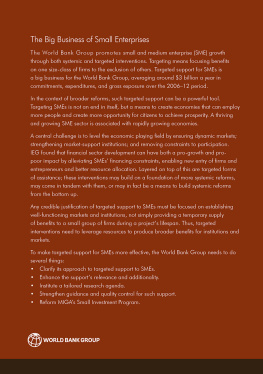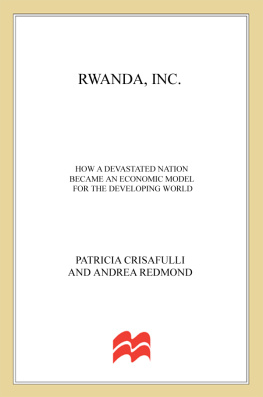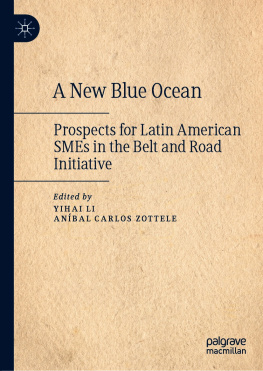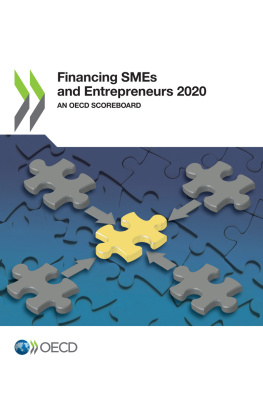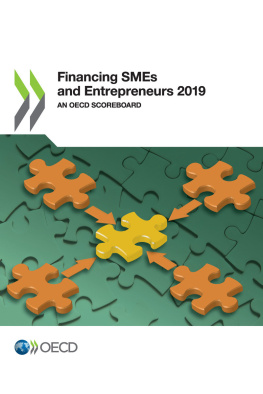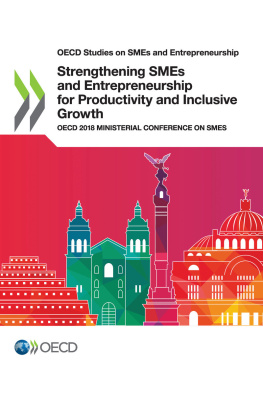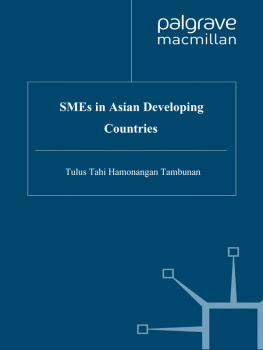ENTREPRENEURS AND SMEs
IN RWANDA
POLITICS AND DEVELOPMENT IN CONTEMPORARY AFRICA
Published by one of the worlds leading publishers on African issues, Politics and Development in Contemporary Africa seeks to provide accessible but in-depth analysis of key contemporary issues affecting countries on the continent. Featuring a wealth of empirical material and case study detail, and focusing on a diverse range of subject matter from conflict to gender, development to the environment the series is a platform for scholars to present original and often provocative arguments. Selected titles in the series are published in association with the International African Institute.
Published in partnership with the International African Institute.
The principal aim of the International African Institute is to promote scholarly understanding of Africa, notably its changing societies, cultures and languages. Founded in 1926 and based in London, it supports a range of seminars and publications, including the journal Africa.
www.internationalafricaninstitute.org
Managing Editor: Stephanie Kitchen
Series Editors: Jon Schubert (Brunel University) and Elliot Green (London School of Economics and Political Science)
Editorial board:
Rita Abrahamsen (University of Ottawa); Morten Boas (Norwegian Institute of International Affairs); David Booth (Overseas Development Institute); Pdraig Carmody (Trinity College Dublin); Neil Carrier (University of Bristol); Fantu Cheru (Leiden University); Kevin Dunn (Hobart and William Smith Colleges); Amanda Hammar (University of Copenhagen); Alcinda Honwana (Open University); Paul Jackson (University of Birmingham); Gabrielle Lynch (University of Warwick); Zachariah Mampilly (Vassar College); Henning Melber (Dag Hammarskjld Foundation); Garth A. Myers (Trinity College Hartford Connecticut); Lonce Ndikumana (UMass Amherst); Cyril Obi (Social Science Research Council); Susan Parnell (University of Cape Town); Mareike Schomerus (Overseas Development Institute); Laura Seay (Morehouse College); Howard Stein (University of Michigan); Mats Utas (Uppsala University); Alex de Waal (Tufts University).
Already published:
Mobility between Africa, Asia and Latin America, edited by Ute Rschenthaler and Alessandro Jedlowski
Agricultural Reform in Rwanda, Chris Huggins
Liberias Female Veterans, Leena Vastapuu and Emmi Nieminen
Food Aid in Sudan, Susanne Jaspars
Kakuma Refugee Camp, Bram J. Jansen
Development Planning in South Africa, John Reynolds
Uganda, Jrg Wiegratz, Giuliano Martiniello and Elisa Greco
AIDS in the Shadow of Biomedicine, Isak Niehaus
Negotiating Public Services in the Congo, Tom De Herdt and Kristof Titeca
BRICS and Resistance in Africa, edited by Justin van der Merwe, Patrick Bond and Nicole Dodd
Ironies of Solidarity, Erik Bhre
Africas Shadow Rise, Pdraig Carmody, Peter Kragelund and Ricardo Reboredo
Malawi, edited by Matthias Rompel and Reimer Gronemeyer
Forthcoming titles:
Contesting Africas New Green Revolution, Jacqueline Ignatova
Youth on the Move, Fana Gebresenbet and Asnake Kefale
Politics of Fear in South Sudan, Daniel Akech Thiong
Decolonizing Civil Society in Mozambique, Tanja Kleibl
War, Women and Post-Conflict Empowerment, Josephine Beoku-Betts and Fredline MCormack-Hale
Angolas Securitized State, Paula Roque
Vision 2020, the government of Rwandas economic development plan, set the ambitious aim of achieving middle-income status for the country by 2020 (Minecofin, 2000). The strategy for achieving this goal envisioned transforming Rwanda from an agricultural to a knowledge-based economy. A central element of the strategy was the creation of an institutional context that would foster the emergence of a vibrant private sector, which would spearhead the economys transition and generate high levels of non-agricultural employment.
Programmes designed specifically to catalyse entrepreneurship and the emergence of dynamic small and medium enterprises (SMEs) were created.
Rwandas development plan was fully consistent with the prescription advocated by leading development agencies including the World Bank, International Monetary Fund (IMF), the Organisation for Economic Co-operation and Development (OECD) and major donor nations. Since initiating the strategy, billions of dollars have been injected in order to facilitate Rwandas economic transformation. Paradoxically, despite all that has been done, the dynamic entrepreneur-led SME sector that was anticipated remains conspicuous by its absence. The commercial landscape is dominated by a vast number of informal microenterprises typically household level subsistence enterprises comprising own-account workers who are, if anything, supported by unpaid family workers. The paradox, though, is not due to any lack of effort on the part of the government and people of Rwanda, who have diligently followed the prescription that was advanced by the major development institutions.
Twenty years on, they have every right to ask why it has not worked. It is a question that this book seeks to answer.
The book is divided into five parts. Part I begins by defining the books key terms and the research methodology that was employed. It then examines the main arguments populating entrepreneurship theory and explores the core beliefs that underpin the development agencies assertions that its policy prescription will catalyse the emergence of a large number of domestic entrepreneurs, dynamic SMEs and employment opportunities. Part I analyses the role ascribed to entrepreneurs in economics and popular assertions that entrepreneurship is dependent upon access to financial, human and social capital. Theories that entrepreneurs possess certain psychological characteristics, which predispose them to setting up businesses, are also investigated. It is argued that entrepreneurship theory is highly fragmented and characterized by serious inconsistencies and contradictions.
The second part of the book focuses on Vision 2020. It examines the institutional framework that has been created and the measures designed specifically to catalyse and support the emergence of domestic entrepreneurs and SMEs. These measures included enhanced access to credit, the development of a large-scale business plan competition designed to identify and support potential entrepreneurs, a major regional cluster strategy based on Porters theories of regional competitive advantage and the incorporation of entrepreneurship teaching into the national curriculum. The investigation finds that a context has been created that is fully consistent with the policies advocated by the leading development institutions and mainstream economists. An analysis of the distribution of enterprises in Rwanda reveals, however, that the strategy has not delivered the dynamic SME sector and non-agricultural employment that was anticipated. Instead the Rwandan enterprise distribution is found to be dominated by a vast number of informal, household level, subsistence enterprises.
Part III focuses on interviews with thirteen successful Rwandan entrepreneurs. It begins by introducing them and their businesses, and then analyses the narrative accounts of their entrepreneurial journeys. These are examined for insights into how they went about setting up their businesses and the factors that might have influenced their success. The findings indicate the presence of certain psychological characteristics that have come to be associated with entrepreneurs. Most striking, though, is the discovery that the narratives were antithetical to key elements of entrepreneurship theory.


